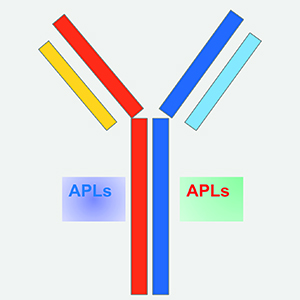A review on management of antiphospholipid syndrome in clinical practice

All claims expressed in this article are solely those of the authors and do not necessarily represent those of their affiliated organizations, or those of the publisher, the editors and the reviewers. Any product that may be evaluated in this article or claim that may be made by its manufacturer is not guaranteed or endorsed by the publisher.
Authors
Antiphospholipid syndrome (APS) is a systemic autoimmune disease characterized by thrombotic or obstetric events occurring in patients with persistent antiphospholipid antibodies. Thrombotic APS is characterized by venous, arterial, or microvascular thrombosis. The diagnosis is accepted when both one clinical and one laboratory criteria according to the updated Sapporo classification are established. APS may occur in combination with other autoimmune diseases, mainly systemic lupus erythematosus, or in its primary form. Long-term anticoagulation with a vitamin K antagonist is the standard of care for patients who develop thrombosis, considering the high rate of recurrent thrombosis. The current international guidelines are not in favor of recommending direct oral anticoagulants for secondary prevention of thrombotic antiphospholipid syndrome, especially in the context of arterial thrombosis and triple-positive antiphospholipid patients. The most common approach, endorsed by the American College of Chest Physicians guidelines is the combination of heparin and low-dose aspirin (75-100 mg) daily for women who fulfill the clinical and serologic criteria for obstetric APS. New potential therapeutic approaches are under evaluation but actually the anticoagulation remains the cornerstone of treatment.
How to Cite

This work is licensed under a Creative Commons Attribution-NonCommercial 4.0 International License.
PAGEPress has chosen to apply the Creative Commons Attribution NonCommercial 4.0 International License (CC BY-NC 4.0) to all manuscripts to be published.






